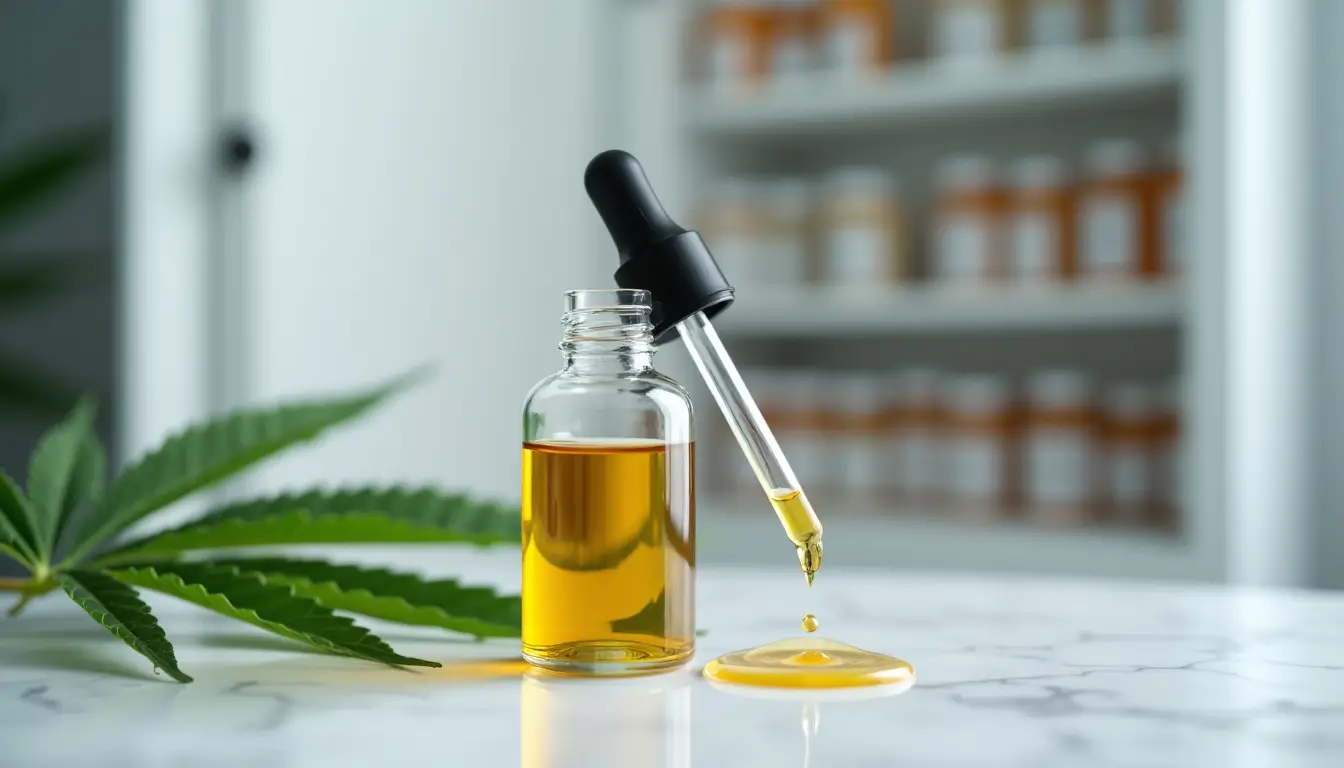CBD oil’s side effects are a common concern. Studies show CBD remains safe to use in doses up to 200 mg daily. However, our research shows 91% of people with seizure disorders experience side effects from FDA-approved CBD medications.
CBD oil can cause mild problems like drowsiness and dry mouth. The risks become more serious when you mix it with other medications. Safety becomes even more critical because 21% of CBD products sold online contain high amounts of THC. These products often contradict their own label claims.
This piece will get into CBD oil’s potential risks and its interactions with common medications. You’ll learn what might make you more likely to have adverse reactions. We’ll also give you practical tips to help you use CBD products safely while keeping side effects minimal.
Common Side Effects of CBD Oil
Studies show CBD oil can cause several side effects. Most users experience mild to moderate reactions. Let’s get into the most common effects that show up in clinical studies.
Mild digestive issues
Stomach problems are among the most common CBD side effects. Clinical trials show that users might get diarrhea and reduced appetite. Some people also feel nauseous during CBD treatment. High-quality CBD products and careful monitoring of your body’s response can help reduce these digestive issues.
Changes in appetite and weight
CBD’s effect on appetite shows some interesting patterns. A review of 11 clinical trials found that CBD mainly reduces appetite and body weight. A study of children with Dravet syndrome showed that 28% of participants who took CBD reported decreased appetite, while only 5% in the placebo group had this effect. People react differently though – some might feel hungrier, especially if they have poor appetite from anxiety or pain.
Drowsiness and fatigue
Many studies point to drowsiness and fatigue as notable side effects. One study with children who had uncontrolled epilepsy found drowsiness in 37% of participants and fatigue in 16%. A detailed analysis showed that sleepiness and tiredness ranked among the most common negative effects.
CBD’s effect on drowsiness changes with the dose. Low doses (25-50 mg daily) help people with anxiety sleep better. Medium doses (300 mg) don’t affect sleep in healthy people. Higher doses (600 mg daily) make about 20% of users drowsy.
Other common side effects include:
- Dry mouth from less saliva production
- Changes in alertness levels
- Mood changes, including irritability
- Possible liver function changes, mainly with high doses
Dose size and personal sensitivity play a big role in how severe these side effects are. Studies show higher CBD doses (10-20 mg/kg) cause more noticeable drowsiness in up to 30% of users. Starting with lower doses helps you find what works best for your body and reduces possible side effects.
How CBD Oil Interacts With Medications
CBD’s safe usage depends on understanding how it interacts with medications. Research shows CBD affects the CYP450 enzyme system in the liver that breaks down about 60% of prescribed medications.
Blood thinners and CBD
CBD has major effects on blood-thinning medications, especially warfarin. Patients who took both CBD and warfarin needed their warfarin dose reduced by 30% to avoid bleeding risks. CBD can also change how the body processes anticoagulants like clopidogrel, which might increase stroke risks. Scientists have found 610 drugs that interact with CBD, and blood thinners showed some of the strongest interactions.
Anti-seizure medications
CBD’s interaction with anti-seizure medications needs close monitoring. Research shows CBD affects several anticonvulsant medications:
- CBD doses make Clobazam and N-desmethylclobazam levels rise by a lot
- CBD combined with valproic acid could raise liver enzyme levels
- CBD use can increase levels of topiramate, felbamate, and levetiracetam
Antidepressants and anxiety drugs
A newer study shows important interactions between CBD and many antidepressants. CBD blocks CYP2D6 enzyme activity, which could raise blood levels of SSRIs, tricyclic antidepressants, and antipsychotics. Research found that CBD changed how the body processed citalopram and escitalopram at normal treatment doses.
These interactions go beyond just these medication types. Scientists have identified 57 prescription medications that could have dangerous interactions with CBD. These problems might show up as:
- More drowsiness when taken with certain medications
- Changes in medication levels in the blood
- Higher risk of liver problems with specific drug combinations
Senior citizens face bigger risks from these interactions because they often take multiple medications. You should talk to your healthcare provider before starting CBD, especially if you take prescription medications. This helps manage potential risks and ensures you can safely use CBD with other treatments.
Risk Factors That Increase Side Effects
Your body’s response to CBD oil depends on many factors. These range from your physical characteristics to the quality of products you use. You can minimize unwanted reactions by knowing these risk factors.
Age and health conditions
CBD affects older adults differently. Our bodies change as we age and this impacts how we process substances like CBD. Studies show that seniors need lower doses because CBD stays in their system longer. This happens because older bodies have more fat compared to water content.
Some health conditions can increase CBD’s effects:
- Patients with liver disease need lower CBD doses to stay safe
- People with Parkinson’s disease might see their muscle movement and tremors get worse with high doses
- Pregnant and nursing mothers should stay away from CBD because products might contain harmful substances
Dosage amounts
The link between dosage and side effects is vital. Studies show that taking up to 200 mg daily stays safe for 13 weeks. Higher doses make unwanted reactions more likely.
Product reliability remains a big concern. The largest longitudinal study of CBD products bought online revealed much contained less CBD than promised. Even worse, 21% of products had high THC levels, whatever the label said.
These factors affect how safe your dose is:
- Body weight – smaller people usually need less CBD
- Other medications – some drug combinations raise your risk of side effects
- Product quality – dirty or wrongly labeled products bring extra risks
CBD’s effects go beyond simple dose and response patterns. Side effects happen more often when multiple risk factors come together. To name just one example, older people taking several medications face higher risks of drug interactions. Health conditions make things more complex because they can change how your body handles CBD and make side effects more likely.
Ways to Minimize CBD Oil Side Effects
Steps taken early minimize CBD oil side effects. Medical experts suggest several practical ways to use CBD safely.
Start with low doses
CBD treatment needs a careful approach. Research shows doses up to 200 mg daily are safe when used for 13 weeks. Here’s what you should do:
- Start with minimal doses
- Increase gradually based on how you respond
- Watch for changes in symptoms or side effects
- Let your doctor guide dose adjustments
Patients with liver conditions should take lower doses to avoid complications. Keeping detailed records will help you find your ideal dosage range and reduce unwanted effects.
Choose quality products
Quality makes a big difference in safety. A troubling study showed that more than 25% of CBD products had less CBD than stated on the label. You can ensure product safety by:
- Picking products tested by independent labs
- Finding Certificates of Analysis (COA)
- Checking third-party test results
- Making sure CBD content is labeled correctly
Lab testing is crucial because the FDA doesn’t regulate CBD supplements. Without oversight, product quality and purity can vary by a lot between manufacturers.
Track your symptoms
A detailed journal is a great way to get better at managing CBD use. Writing down specific details helps you spot patterns and get the best results. Make sure to record:
- CBD product type
- Amount taken and when
- How your body and mind respond
- Side effects you notice
- How it works with other medications
Regular tracking makes shared decision-making with healthcare providers easier. Let your doctor know about CBD use so they can check your liver enzymes regularly. This team approach will give a safer, more effective CBD treatment and reduce possible complications.
Note that everyone responds differently to CBD based on their age, health, and other medications. Working with healthcare providers helps you find the right dose and understand risks specific to your case.
Conclusion
CBD oil shows promising benefits, but research indicates safe use needs careful attention. Most users only experience mild side effects such as drowsiness or digestive problems. The interaction between CBD and medications through the CYP450 enzyme system needs close monitoring.
Quality products and proper dosing guidelines ensure safety. The recommended starting dose ranges from 25-50mg per day. You should track your body’s response and adjust the dose accordingly. People with existing health conditions and seniors need additional precautions. Healthcare providers should guide their CBD journey.
Scientific evidence backs CBD’s safety profile when used properly. The lack of FDA oversight leads to substantial variations in product quality. Third-party testing and certificates of analysis are vital safeguards before starting CBD oil supplements.
Our related articles about CBD dosing protocols and product selection criteria provide more details about benefits and usage guidelines. Your success with CBD depends on understanding personal risk factors and taking steps to minimize side effects.
FAQs
What are the most common side effects of CBD oil?
The most common side effects of CBD oil include mild digestive issues like diarrhea, changes in appetite and weight, and drowsiness or fatigue. Some users may also experience dry mouth and mood alterations. The severity of these effects often depends on the dosage and individual sensitivity.
Can CBD oil interact with medications?
Yes, CBD oil can interact with various medications. It affects the CYP450 enzyme system in the liver, which metabolizes many prescription drugs. CBD may interact significantly with blood thinners, anti-seizure medications, and certain antidepressants. It’s crucial to consult a healthcare provider before using CBD if you’re on any medications.
Is CBD oil safe for everyone to use?
While CBD is generally considered safe, certain groups should avoid or use it with caution. Pregnant and breastfeeding women should not use CBD. People with liver conditions, older adults, and those on multiple medications may need to adjust dosages or avoid CBD altogether. Always consult a healthcare professional before starting CBD, especially if you have existing health conditions.
How can I minimize potential side effects of CBD oil?
To minimize side effects, start with a low dose of CBD and gradually increase it while monitoring your body’s response. Choose high-quality products with third-party testing and accurate labeling. Keep a detailed journal of your CBD use, including dosage, effects, and any side effects experienced. This information can help you and your healthcare provider optimize your CBD use.
Does CBD oil affect liver function?
CBD oil may potentially affect liver function, particularly at high doses. Some studies have shown that CBD can cause changes in liver enzyme levels, which could indicate liver stress. However, this typically occurs with very high doses or when CBD interacts with certain medications. Regular monitoring of liver function is recommended for those using CBD, especially if you have pre-existing liver conditions or are taking other medications.
Read More On
CBD Oil for Pain Management
How Does CBD Oil Make You Feel?
Top 10 Benefits of CBD for Mind and Body Wellness
What is CBD?
How Do You Use Pet CBD Oil?




